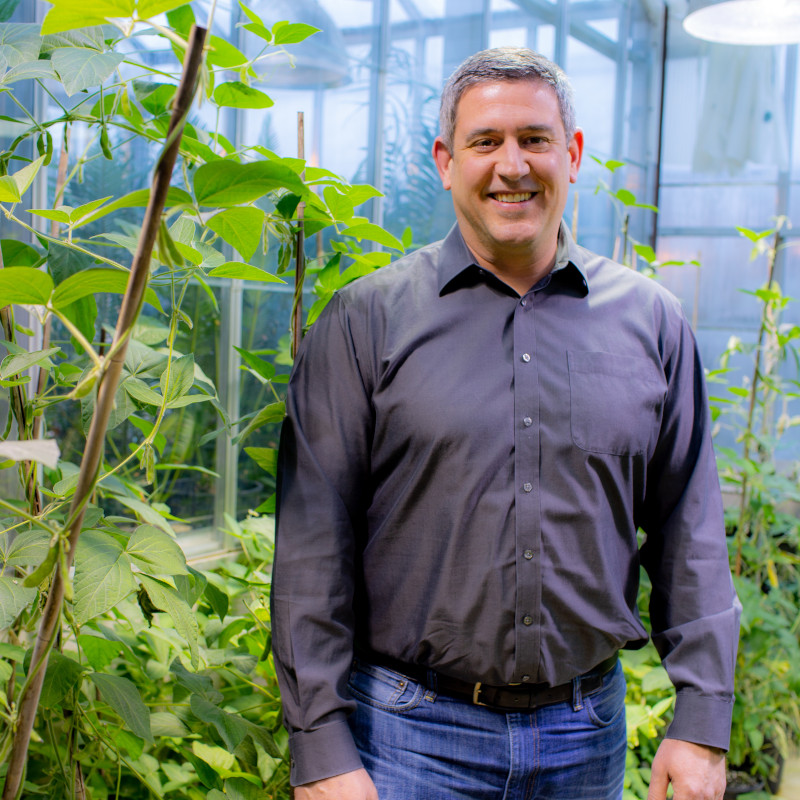Respected Plant Physiologist Carl Bernacchi Joins Full-Time Faculty at Illinois.

Carl Bernacchi, formerly a plant physiologist with the USDA and Deputy Director of Phenotyping at the RIPE project, recently transitioned into a full-time faculty position at the University of Illinois.
“It has been a bit of a winding road,” Bernacchi reflects. “Joining the faculty allows me to pursue opportunities that often aren’t available to government scientists.”
Bernacchi’s journey into science began unconventionally. Initially aiming for a medical career, he found his passion for lab work during a required class for his master’s in general biology and became a research assistant in a plant ecology lab at Bradley University.
As he worked on a project focused on plant growth in elevated CO₂, it became clear that the facilities at Bradley could no longer support the research. This led him to spend several months at Duke University’s state-of-the-art phytotron facility, where being surrounded by leading research and incredibly brilliant scientists made him feel like he belonged.
That experience marked a turning point.
“It just built together,” he said.
“This was the work I wanted to do for the rest of my life.”
Currently, Bernacchi channels that passion into his work at the RIPE project, led by Illinois. The initiative focuses on engineering crops to be more productive by improving photosynthesis, boosting yields. RIPE is supported by Gates Agricultural Innovations (Gates Ag One).
As the Deputy Director of Phenotyping at RIPE, he leads efforts to implement advanced technologies like high-throughput phenotyping systems that measure plant growth quickly and efficiently. These tools help determine whether the improvements made to crops in controlled environments translate to better results in the field, under real-world stressors.
Some of these innovations include tools that can analyze up to 2-3 million plants a day compared to just 50 using traditional methods, while also providing precise measurements of crop responses. This technology enables researchers to observe crop growth on a scale not visible to the human eye.
While researchers have made progress in measuring overall plant growth, the next challenge is understanding organ-level changes with modifications. Tools like the RIPE Aerial Plant Phenotyping System (RAPPS) will be essential in identifying these changes in detail.
As theme leader of sustainability for the Center for Advanced Bioenergy and Bioproducts Innovation(CABBI), Bernacchi investigates biogeochemical cycling and agricultural ecosystems.
Furthermore, through the (SCAPES) project, he explores agrivoltaics. As solar farms expand across the Midwest, he envisions a modern take on polyculture: solar panels as the big plant, food crops as the small plants. This approach aims to optimize space by using the same land for both clean energy and agriculture. The approach supports a sustainable future while preserving the essence of rural communities.
Despite his deep roots in research, Bernacchi has continued teaching for the last twenty years. He’s maintained a consistent presence in the classroom, teaching one course annually in the Department of Crop Sciences and Plant Biology. Now, as he steps into a full-time faculty role, he is eager to deepen his connection to the university and expand the impact of his work.
“I've always felt that if you're a scientist and you're located on a college campus, you would do yourself a tremendous favor by getting in front of students.” He believes that no position titles or responsibilities should stand in the way of offering educational opportunities.
As climate change and food security grow more urgent, he sees the pressure as both a motivation and responsibility scientists must embrace.
Even when faced with the weight of these concerns, he finds it most effective to redirect the stress and worry into his research while also remembering the global nature of this endeavor.
“There are hundreds and thousands of really smart scientists globally that are looking for solutions,” he reflects. “I’m just happy to be part of that group.”
For Bernacchi, being a part of the global scientific community is not about seeking recognition, it is about contributing to something larger, advancing knowledge through collective effort.
“All research matters whether that research yields incredible novel results or if it confirms something or if it shows nothing, the fact is that research advances our knowledge.”
Collaboration is central to Bernacchi’s team, with members bringing diverse expertise in areas such as plant physiology, ecology, physics, GIS, and computer science. This team is truly a melting pot, a blend of diverse backgrounds, experiences, research, and education to tackle big questions from multiple angles. Their shared goals foster an environment where collaboration thrives, and differences are set aside.
Intentional collaboration is at the heart of the lab’s culture. Rather than growing into a massive operation, the lab remains close-knit enough for real conversations and an open-door policy. The learning goes both ways; Bernacchi finds he gains as much from his team as they do from him.
Of course, when the right opportunity arises, expansion occurs naturally.
A potential future research direction for Bernacchi is expanding into food production for direct human consumption. To him, the Midwest offers an ideal location to de-risk global food production.
With his skill set, he could see collaboration with horticulturists to address climate change and food insecurity-related issues.
Through initiatives like RIPE, research projects, and teaching endeavors, Carl Bernacchi’s work demonstrates that science is not merely about understanding the world; it is about creating positive change. His contributions push science beyond boundaries and closer to the communities where it matters.
This story was written by Maria Raza, RIPE’s science communication intern
